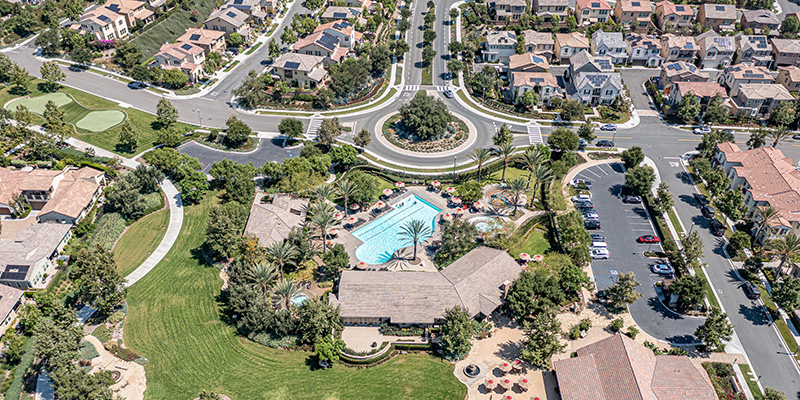HOA insurance may not seem important at first. However, it’s crucial if you want to save your homeowners’ association from huge losses. What is HOA insurance, and how does it benefit your homeowners’ association? Let’s find out.
What Is HOA Insurance?
HOA insurance, or an HOA master insurance policy, protects your homeowners’ association from liability. It protects your association from potential financial losses in case an accident happens within the premises. Moreover, it covers physical damage sustained by your common areas and structures.
What Does HOA Insurance Cover?
Standard HOA insurance coverage doesn’t include every aspect of your homeowners’ association. In fact, it mainly covers HOA liability insurance and mainly encompasses the following:
 General Liability. This includes expenses that the HOA may incur when there’s a lawsuit against the association. For example, someone may get injured within HOA property and hold the homeowners’ association liable. In such cases, your HOA insurance policy will cover the costs.
General Liability. This includes expenses that the HOA may incur when there’s a lawsuit against the association. For example, someone may get injured within HOA property and hold the homeowners’ association liable. In such cases, your HOA insurance policy will cover the costs.- Physical Damage. This includes expenses related to damages against HOA infrastructure and common areas. It can help you cover repair costs after an accident or natural disaster like a fire or hailstorm.
These are the most basic things your HOA insurance will cover. However, coverage may vary depending on the insurance company and policy you get. Some companies may offer extensive coverage, while others only provide the essentials.
For example, some insurance policies don’t cover fire or flood-related damage. Hence, checking your HOA insurance policy to see what’s covered is crucial. You may then need to upgrade your policy or purchase extra insurance to cover other areas.
How Is Condo Insurance Different?
If your HOA manages a condominium, there can be a big difference in coverage. That’s because condominiums have blurrier lines that separate HOA property from homeowner property. As a result, condo insurance will further distinguish its policies by separating them into two kinds:
- Bare Walls Coverage. This policy covers the basic structure of the condominium. It also covers everything within the walls, like plumbing, wiring, and insulation. With it, residents don’t need to insure their walls.
- All-In Coverage. This policy includes bare walls coverage and extends its scope. On top of what’s covered in Bare Walls Coverage, it also covers installations like countertops and appliances. As a result, residents will only need to insure what’s not covered in the condo insurance policy.
How Does Your HOA Benefit?
Homeowners association insurance can be beneficial in many ways. The most obvious is that it protects your HOA from incurring unexpected and often substantial costs. Otherwise, your HOA must pay for physical damage and liability expenses through internal funds.
These costs can be high, especially if you pay for property damage due to earthquakes and hurricanes. Meanwhile, liability expenses can snowball into larger amounts because of the legal and settlement fees. Even if your HOA wins the lawsuit, the associated costs in legal defense can be tremendous.
Furthermore, some states require insurance for homeowners associations. For example, the state of California requires at least 2 million dollars in HOA coverage through Civil Code Section 5805. Meanwhile, Arizona also has certain HOA insurance requirements for HOAs and condominiums. In addition, some HOA bylaws require at least some insurance coverage.
What Type of Coverage Does Your HOA Need?
Getting basic insurance for HOA is necessary, but it doesn’t stop there. That’s because you should also sufficiently cover your HOA’s other needs. To cover those, your HOA may also need the following:
- Comprehensive General Liability. This includes general liability coverage for those outside of your regular HOA insurance policy.
- Comprehensive Equipment Coverage. This covers damaged equipment that your HOA master policy doesn’t protect. They can include general equipment or specific ones, depending on the provider.
- Catastrophe Insurance. This covers property damage from natural disasters like hurricanes, earthquakes, and typhoons.
- Workers’ Compensation Coverage. This covers employee injuries and claims against the HOA when a worker gets injured.
- Discrimination Coverage. This covers the related costs when someone, like an evicted tenant, makes a discrimination claim against the HOA.
- Crime and Fidelity Insurance or Employee Dishonesty Coverage. This protects the HOA from losses when a board member or employee commits a crime or steals property.
- Directors & Officers (D&O) Liability Insurance. This covers directors and HOA board members who may be accused of wrongful acts. It shields them from personal liability as long as the acts are unintentional.
Remember that what you include in your HOA insurance policy will depend on your community. For example, your HOA may need Catastrophe Insurance if your community is more vulnerable. Furthermore, smaller communities may not need Workers’ Compensation Coverage because it doesn’t employ as many workers tending to common areas.
Remember to assess your community’s needs before purchasing a policy. Ensure the policy you choose will provide sufficient coverage to protect your HOA. In addition, it’s equally important to ensure no overlapping policies. Otherwise, your homeowners will have to pay bloated assessment fees.
 What If Your HOA Insurance Doesn’t Have Sufficient Coverage?
What If Your HOA Insurance Doesn’t Have Sufficient Coverage?
If you don’t have enough coverage, don’t worry. Most insurance policies renew every year. Therefore, you can upgrade your policy once the term ends. Just remember to review your current policy and the upgrades you need to purchase.
How Much Is HOA Insurance?
The cost of a policy varies between HOA insurance companies. It also depends on the coverage, number of shared areas, and community size. Typically, HOA insurance may cost anywhere between $500 to $1,500 annually.
However, remember that these amounts may change depending on the claim rates. If the past year had more claims, your insurance provider might bump up the price. Moreover, insurance companies may increase the rates the older your equipment and infrastructure become.
Who Pays for HOA Insurance?
HOA insurance premiums are charged to homeowners. It’s usually included in their monthly dues. Furthermore, each homeowner typically pays the same amount as long as they have equal access to shared spaces. Also, board members are not exempt from paying insurance premiums and monthly dues. They’re expected to pay their share as long as they live within the community.
Protect Your HOA With Insurance
Many people think HOA insurance is only important because state laws and HOA bylaws require it. However, it’s more than just that. It’s a necessary expense to protect your HOA from unforeseen costs.
Keeping tabs on your various insurance policies can be difficult, especially if you have multiple add-ons. Fortunately, Condo Manager can assist you and make the process much easier. Call us at 800-626-1267 or contact us online to ask for a free demo!
RELATED ARTICLES:
- What Is An HOA Attorney? When Do You Need One?
- What Does An HOA Contingency Mean?
- Condominium Repairs: Who Is Responsible? Condo Owners Or The COA



